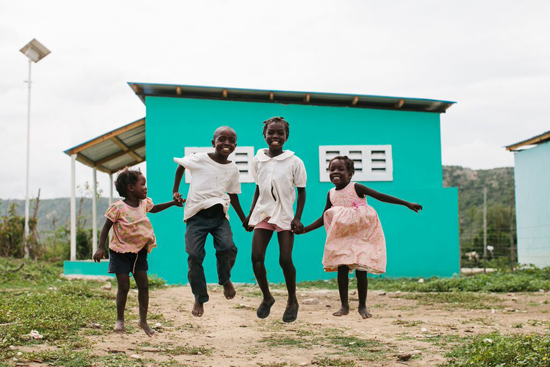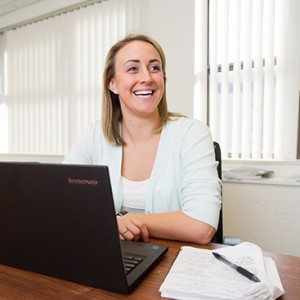Alexandria Lafci was tired of staplers and welding gloves. It was 2014, and she was working in management at an industrial and commercial supplier in Atlanta. She had no sense of purpose. “I was kind of miserable.” Lafci’s goal was to work in international development or nonprofits. She knew many leaders in these fields started in the private sector; she’d thought this would boost her experience.
But it was too removed from her passion.
Looking for a way out, Lafci (CAS’11) attended a social entrepreneurship networking event where she met Matthew Marshall, a user experience design consultant, and Brett Hagler, growth director at Syrup Marketing. Hagler had recently joined a volunteer trip to Haiti and shared what he’d seen. Though it had been four years since a 7.0 magnitude earthquake had devastated the country, and billions of dollars had been raised for relief, tens of thousands of people were still without permanent housing. Later, media investigations would reveal that administrative failures and a lack of transparency about funding distribution contributed to the problem. As of 2015, the Red Cross reportedly had built just six permanent structures for the earthquake survivors.
Lafci was taken aback by the slow progress and wanted to help. She’d become interested in issues of poverty and inadequate housing as a child growing up in a lower-middle-income household with her single mother, who told stories about her childhood in a foster care group home. At age 15, Lafci funded her own participation in a service trip to Peru by slipping handwritten donation requests in the mailboxes of wealthy homes; the trip inspired Lafci to study international relations at the College of Arts & Sciences. After graduation, she taught students from low-income families, many of whom were homeless, in Washington, D.C., with Teach for America. At home and abroad, Lafci saw that poverty and a lack of stable housing negatively impacted families’ health, children’s academic performance, and parents’ ability to hold down a job.
Lafci, Hagler, and Marshall—along with Mike Arrieta, then chief of staff at DocuSign—united over their desire to speed up the development of permanent housing in Haiti, and for philanthropy reform. They believed charities should be held accountable for their promises and transparent about how donations are spent. “A lot of times, when you give to an organization, it’s very much like black hole giving,” says Lafci. “You’re not exactly sure where your funds are going. We just wanted to take all the guesswork out.”
In 2014, with assistance from Silicon Valley start-up incubator Y Combinator—which specializes in backing web and mobile app companies—they founded New Story. The nonprofit, now based in San Francisco, builds houses for Haitian earthquake victims and others in poverty. Donors choose a specific family to support from New Story’s website; every cent of their gift directly supports the family (larger donors fund operations costs separately). Each brick or painted concrete home of roughly 400 square feet costs around $6,000 and takes about 45 days to build. It has a patio, shower, and toilet, and is reinforced for protection against natural disasters such as earthquakes and hurricanes. New Story records move-in day and shares it by email with donors, showing their money was properly spent.
“They believe, as we do, that the tech-powered donor experience is the future of philanthropic giving,” Kat Mañalac, a partner at Y Combinator, told Fast Company in a June 2015 article about the nonprofit. In line with that, New Story is advertising plans to expand its workforce and expects to hire for the kinds of roles usually seen at tech firms: designers, software engineers, online growth experts. “We are bringing on leaders who have the skill sets to be working at top start-ups and innovative companies,” the nonprofit says on its hiring page. But, Mañalac added in Fast Company, New Story isn’t just relying on technical innovation; it has “also succeeded in building transparency and human connection into the platform.”

Alexandra Lafci’s New Story charity has helped build 200 brick or painted concrete homes in Haiti, El Salvador, and Bolivia. Photo by Andy Brophy
At time of writing, New Story had built 200 homes in Haiti, El Salvador, and Bolivia and had more in the works. Its rapid progress and concrete results have attracted high-profile support. In 2016, Baltimore Ravens linebacker Elvis Dumervil became New Story’s Haiti chair and is leading an effort to build 250 homes with funding from NFL players, teams, and fans.
“When families receive a new…safe home, a new story is created,” says Lafci, who is head of operations and was featured with her cofounders in Forbes’ “30 Under 30” list of social entrepreneurs in 2016. “Families have the foundation to create a new life and trajectory for themselves.” She recalls the holey, insect-ridden tents she visited on her first trip to Haiti: the heat inside was overwhelming, and when it rained, the dirt floors turned to mud. Removing people from survival mode, she says, enables them to focus on education and job opportunities.
Lafci’s role is to help families make that leap: she runs all of New Story’s on-the-ground work. She decides what countries and families to serve, secures land on behalf of families, develops partnerships to provide utilities and facilitate schooling and income opportunities, and oversees building plans and spending. Trying to get funding and logistics to keep pace with each other—especially given the ebb and flow of donations—is one of her biggest challenges. “It’s not just collecting that money,” she says. “You have to have on-ground partners who have the ability and capacity to execute on those communities of people we’re funding.”
The headaches are worth it when a family moves into their new home. “Seeing families jumping up and down, their keys in hand…that’s why I work the hours that I work,” she says. “There have been a lot of broken promises in [Haiti] as a whole and definitely for the people we’re serving….You could just see [them thinking], Wow, this is actually happening.”
















































new story, new life and new person.
i like this..